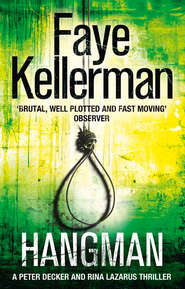По всем вопросам обращайтесь на: info@litportal.ru
(©) 2003-2025.
✖
Peter Decker 2-Book Thriller Collection: Blindman’s Bluff, Hangman
Автор
Год написания книги
2019
Настройки чтения
Размер шрифта
Высота строк
Поля
“I wasn’t on the same plane. Guy Kaffey was up here.” Connors extended his arm. “I was down here.” The accountant lowered his arm.
“Yet you saw him all the time.”
“He was always checking the books. Not just me, everyone. I was one of about twenty.” There was a long pause. “You want to talk to me because I was fired for embezzling.”
“We want to talk to a lot of people, but you did make the list.”
“Lucky me.” Connors took a sip of tea. “It isn’t what you think. I was fired, but no criminal charges were ever filed against me.”
“Yet you didn’t protest the termination,” Decker said. “You didn’t file any wrongful suit against the company.”
When Connors didn’t answer, Brubeck pulled out his notebook and a pen. “Why don’t you tell us what happened?”
“It’s complicated.”
“I’m sure it is.” Decker took out his pad of paper and a pencil. “How about if you start from the beginning.”
Connors took another sip of tea. “I worked for Kaffey for thirty years. Never asked anything from him, but he sure as hell asked a lot of me. Unpaid overtime, on-call twenty-four/seven, especially during tax time. I did it all without a complaint. But then my wife got sick.”
Decker nodded.
“It was only me and my wife,” Connors told him. “We never had kids. Lara was a preschool teacher so I suppose she got her kid fix by her job. And me, I’m a numbers person, not a people person. Lara made all the social decisions.”
“That’s usually the way it is with married folk,” Brubeck said.
“Well, that was the way it was for us.” He warmed his hands on the tea mug. “I went to work, I came home. Whatever Lara planned was okay by me.” His eyes welled up with tears. “She died five years ago from the big C. I can’t seem to move on.”
“My sympathies,” Brubeck told him.
“Must have been hard,” Decker said.
“It was hell, Lieutenant. She was in pain constantly. Even doped up, she was in pain. It was a very long illness. We had insurance, but it didn’t pay for everything. When regular medicine didn’t work, we tried experimental things that insurance wouldn’t cover. We ate through my paycheck, we ate through our savings. The next stop was selling the house. I couldn’t do that to her, but I didn’t want to give up on treatment either.”
Decker nodded and asked him to go on.
“I swallowed my pride and asked Mace Kaffey if he could arrange a loan for me. I knew Mace better than Guy, and everyone at the company knew that Mace was an easier touch than Guy.”
“How long ago was this?” Decker asked Connors.
“Maybe six years ago—at the beginning of the end.” Connors let out a deep sigh. “Mace told me to write off the loan as an inventory expense. And he told me to cut the check for thirty thousand, that he’d take a little extra in case I needed more. The company does business with hundreds of suppliers so it wasn’t hard to bury it somewhere. I knew it was wrong but I did it anyway. Two days later, I had cash in my pocket. I rationalized it by telling myself that I was just following the boss’s orders. I had every intention of paying it back.”
“How did you plan on doing that?” Decker asked.
“Doing freelance work. I told Mace that I’d pay back every cent, but he told me not to worry about it. Just get the wife better and then we’d talk. It sounded too good to be true, but I wasn’t going to question him. Twenty thousand was a lot, but I knew I could make that amount up. The problem was …”
He put the mug down on an end table.
“It wasn’t just twenty thousand. It was twenty thousand, then forty, then sixty. By the time she died, I was one hundred and fifty thousand in the hole. That’s a lot of money to pay back considering that my life savings, my pension plan, and my wife’s pension plan had been totally wiped out. I had nothing left to my name except the house.”
Connors rubbed his eyes.
“I went to Mace to tell him that I was going to sell the house to pay back the loan and he told me to hold off and not to do anything rash. I wasn’t going to insist.” A long pause. “He also told me to keep on borrowing from the company for just a while longer. He said that there were other people in bad straits. I needed to keep at it a little bit longer. And for my effort, he’d knock off some of the loan money.”
“And you went along with it,” Decker said.
“I was in debt and he was my boss. If he said to keep doing it, I kept doing it. I did summon up enough nerve to ask him if it was okay with Guy.”
“What’d he answer?” Brubeck said.
“He said that Guy skimmed off the top all the time. All in all I wrote about two hundred thousand dollars’ worth of phony checks.”
“And that was okay with you?” Decker said.
Connors looked at the detectives. “I had lived two years in hell and I was deep in debt. So whatever Mace said, I did and didn’t ask questions. Anyway, the whole mess came to a head when the company got audited. That meant opening the books. The embezzlement was discovered, the IRS began to levy charges against Kaffey Industries, and a huge lawsuit ensued between the brothers. I thought I was going down with the ship, but Mace, God bless him, covered for me.”
“How?” Brubeck asked.
“He told Guy that the discrepancies had to do with the increased cost of materials or something stupid like that. Guy didn’t buy it. Hence the lawsuit. But no matter how bad it looked for Mace, he didn’t rat me out to the authorities. I was really grateful.”
Decker said, “Mr. Connors, Mace was accused of embezzling five million dollars. Your part in the scheme didn’t amount to nearly that much.”
Connors shrugged. “Maybe he had the same kind of arrangement with a few other accountants. I was just one of many.”
“You were an account executive,” Brubeck said.
“Like I said, there are around twenty account executives in the company. Each one is in charge of one project or another.”
“If Mace was stealing from the company, why didn’t Guy kick his brother out?”
“I can’t say for sure, but I think Mace wasn’t lying when he said that Guy skimmed off the top, too. Since Guy was the CEO, he was much more vulnerable to jail time for cheating the IRS than Mace was. It was probably cheaper for Guy to keep him on rather than to prosecute him.”
Decker said, “So the two brothers settled and Mace was moved back east.”
“Yes, sir,” Connors answered. “And that was that.”
“Except for one thing,” Decker said. “You were caught embezzling money even after Mace left the West Coast.”
Connors threw up his hands.
Decker said, “Would you care to explain?”
“No charges were brought against me.”
“You asked Mace for another favor.”
“I just told him, I’d rather put a bullet into my head than go to jail.”
“And he covered for you.”











